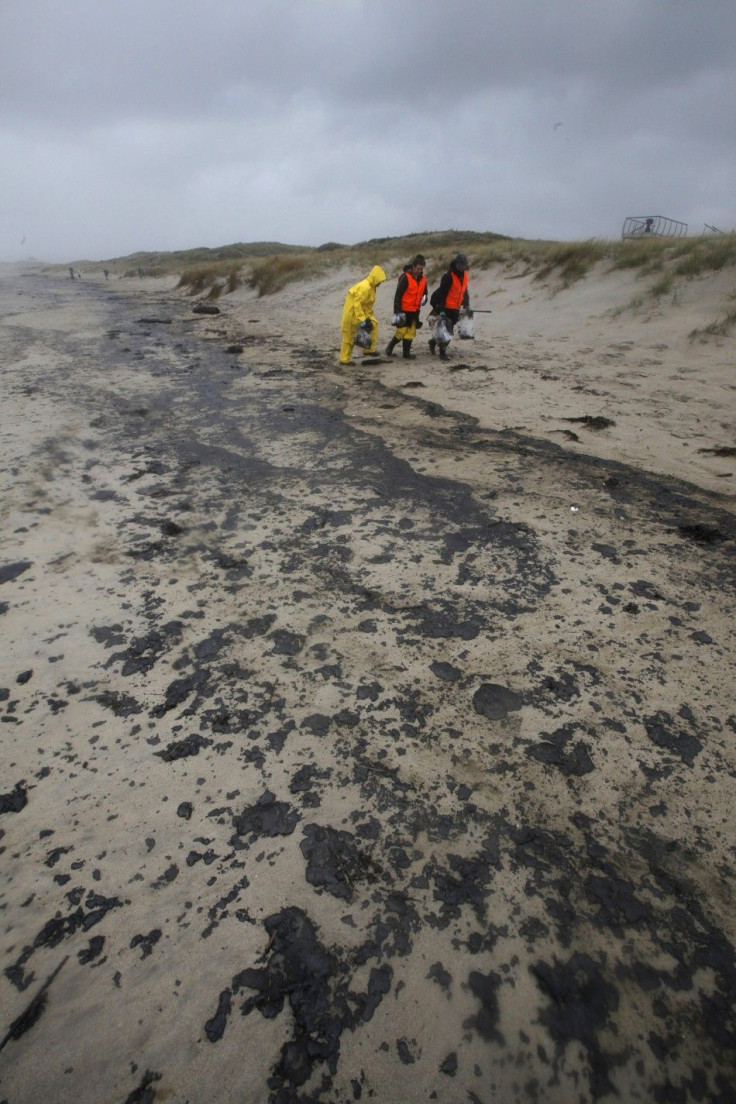New Zealand Oil Spill to Get Worse; Officials Fear Rena May Sink

The New Zealand oil spill, already the nation's worst-ever maritime environmental disaster, is only getting worse. While response teams combed the oil-slicked beaches on Monday, the Liberia-flagged Rena cargo ship teetered on the brink of mayhem in the Bay of Plenty, threatening to break apart and become dislodged from the Astrolabe Reef that it rammed up against on Oct. 5.
Salvage crews added extra pumps and worked to get more oil from the ship Monday morning, though rough seas have stymied salvage efforts. Less than 85 tons of oil has been removed from the severely listing ship. An estimated 1,400 additional tons of fuel remain onboard.
Over 350 tons of oil has leaked into the Bay of Plenty, coating the popular tourist beaches of Mount Maunganui and Papamoa.
Patties of oil from Rena were found as far away as the stratovolcano White Island on Monday and oil is expected to wash up along the North Island's East Cape - made famous in the 2002 movie Whale Rider -- in the coming days.
Meanwhile, response crews are working to clear the beaches and aid the oil-slicked wildlife. An estimated 1,300 seabirds have been killed so far.
Situation Getting Worse
The weather worsened late Monday and pumping was again stopped as wind battered the ship.
Citing several serious stress cracks in the vessel's hull -- including one that runs the width of the ship -- authorities now fear that Rena may slip from its unstable mooring and sink into the sea. By Monday, just the bow of the ship remained stuck on the reef while the stern swung free.
I think it's a case of getting everything off that you can, Steven Joyce, New Zealand's transportation minister, said in a statement. He added that the ship is now listing at a critical 21 degrees. The tilt has caused more than 100 containers to fall overboard.
It's variable and very dangerous, Joyce added.
He said that there was little chance that workers could remove all the oil before the vessel broke free.
Matt Watson, a member of the Svitzer salvage team, told Radio New Zealand that there will probably be more oil leaving the vessel if the weather turns nasty.
That ship is very, very sick, Watson said. She is fractured, she is broken, she is on her knees.
Accountability
Rena's captain, Mauro Arieves Balomaga, had an unblemished record with his firm until the ship ran aground on Oct. 5, though a number of concerns were raised about the seaworthiness of the vessel.
The captain and an officer of the ship, owned by Costamare Inc. of Greece, were charged under New Zealand maritime law with operating the ship in a dangerous manner. Each could see up to a year in jail.
Costamare officials said in a statement that they are cooperating fully with local authorities, but have not offered any explanation for the grounding. Investigators are currently interviewing the crew of the 775-foot vessel to see how it could have crashed onto a well-known reef in calm waters.
The Reaction
Although locals have been warned to stay off the popular beaches, many remain positive.
Glenn Ormsby, the General Manager of the Tauranga-based Tourism Bay of Plenty, said that the impact is relatively minimal.
The Rena incident has impacted a narrow and contained stretch of our coastline and the management of the container ship and beach clean-up operations are in full swing and being supported strongly by both the local community and visitors to the region, Ormsby told International Business Times on Friday.
We are buoyed by the news that 1000 people hit the beaches today and more than 95 tons of solid waste has been collected from the beaches so far, he added.
Others are less optimistic.
This container oil spill could bankrupt New Zealand, Kip Brook, director of Word of Mouth Media NZ, told International Business Times. This is too large an event for a country of just 4.5 million already reeling from Christchurch's earthquakes, which have claimed 81 lives, ruined the city, and cost up to $40 billion.
Money aside, Brook is worried that it may taint the country's 100% Pure reputation for tourists.
It has been 100 percent pure for years. Now it's 100 percent pure oil.
© Copyright IBTimes 2024. All rights reserved.












